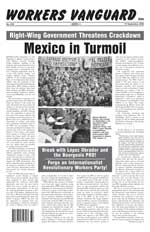

Kentucky Air Disaster: Bitter Fruit of Union Busting Early on the morning of August 27 at Blue Grass Airport in Lexington, Kentucky, a Comair regional jet took a wrong turn onto a short runway, barely got airborne and crashed into a nearby field. Engulfed by flames and smoke, 49 of the 50 people aboard the aircraft perished. Twenty-nine seconds had elapsed from the beginning of the takeoff roll until impact, but no warning was issued from the control tower. Why? The Federal Aviation Administration (FAA) had violated its own rules by scheduling only one air traffic controller to perform all tower duties on the overnight shift. This practice is all too routine in the nation’s air traffic control system, with its chronic staffing shortages, critical equipment failures and deplorable working conditions. There have been net losses of controllers every year for the past three years, and the FAA is now short by at least 1,000 controllers nationwide. Nearly two years before the fatal crash, a prescient Lexington control tower supervisor warned in a memo that coverage was stretched so thin that it “can cost lives.” The chaos in air transport today is not only an example of the anarchy and decay that reigns in the capitalist economy, it is also the bitter fruit of the most massive union-busting attack since before the CIO was founded in the 1930s. Twenty-five years ago, on 3 August 1981, the 13,000 members of the Professional Air Traffic Controllers Organization (PATCO) went on strike, demanding shorter hours, increased staffing and improved wages from the FAA. Putting into action a strikebreaking plan drawn up under the Democratic Carter administration, Republican president Reagan two days later fired all the controllers and had PATCO leaders hauled off to jail in shackles. In short order, union members were blacklisted, PATCO’s finances were seized and the union was decertified. Labor could have beaten back the union-busters by shutting down the airports. A massive labor demonstration—half a million strong—in Washington, D.C., on 19 September 1981 showed that there was plenty of sentiment in labor’s ranks to beat back the attack on PATCO. But from the outset of the strike, the response of the labor officialdom was to order union pilots, machinists, flight attendants and Teamsters to report to work. This betrayal set the stage for a ruthless capitalist offensive against the unions and the working class as a whole. As part of its vendetta against PATCO, the government, including a Democratic-controlled Congress, imposed a ban on the rehiring of the strikers. While the Clinton administration lifted the ban in 1993, this token gesture has done nothing to reverse the blackballing of PATCO controllers. To date, only 846 strikers, out of more than 5,000 who have applied, have been offered jobs in their profession—and none since 1999. Fatigue and stress, key concerns of the PATCO strikers, plague air traffic controllers no less today. The Lexington controller had slept only two hours, with just nine hours off between shifts. With the bottom line trumping air safety, this Labor Day weekend the FAA saddled controllers with new, more onerous work rules as well as a 30 percent wage cut and reduced pensions. The government will now force controllers who feel unrested to work anyway and has taken away critical break time. As a result, more than one-quarter of controllers are projected to retire within the year. At the same time, the air traffic control system’s infrastructure is dangerously outmoded and crumbling. A recent New York Post (4 September) exposé of the tower at LaGuardia Airport revealed that a crucial ground radar system fails during heavy rain and that this airport, too, often has only one controller on the midnight shift. At the Lexington airport, one time when the radar system wasn’t working properly, management refused to bring in a repair technician because it would mean paying two hours of overtime! And now it comes out that at the time of the crash, Comair was using an out-of-date, FAA-provided chart of the airport. Capitalist looting of this country’s wealth and undermining of infrastructure are a recipe for disaster and have already cost countless lives, as everyone could see when the levees in and around New Orleans broke during Hurricane Katrina. The massive waste, danger and inefficiency of the airline industry under capitalism cries out for centralized economic planning, but that will only come about when the ruling class as a whole has been expropriated under a workers government.
|
|
||||||||||||||||||||||||||||||||||||||||||||||||||||||
